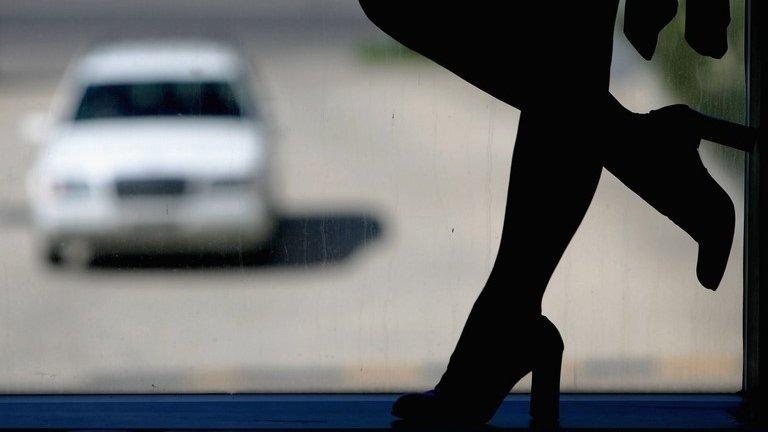The city that allows women to sell sex
- Published
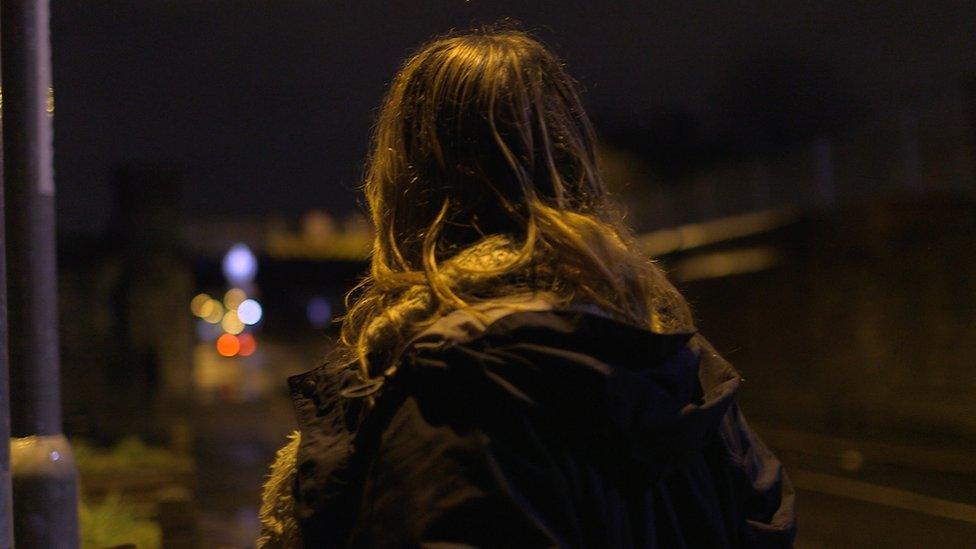
A suburb in Leeds is the first place in the UK where it is permitted for women to sell sex between specified hours. The "managed approach" was introduced to try to control the trade. The Victoria Derbyshire programme spent a night there to find out how it is working.
Chelsea, whose name has been changed, 29, has been a sex worker for five years. She's addicted to crack cocaine and earns roughly £150 a night - which she spends on drugs and gifts for her children. They do not live with her and she would hate for them to know what she does.
In the evenings she puts on her make-up and gets the bus to Holbeck, a mainly industrial area to the south-east of Leeds city centre.
During the day it is bustling, but on a cold March night it is quiet with lots of small, dark areas for sex workers to operate.
Chelsea knows her work is dangerous. "You don't know what type of man you're getting next. They may look all right but they could be nasty. You take a gamble with yourself. It's life or death," she says.

Find out more:
Watch the film in full here

It is not actually illegal to sell sex in Britain, but it is illegal to solicit - offering sex in a public place.
But in this specified network of roads, street prostitutes can sell their services from 19.00 to 07.00 BST, without being stopped by police.
Traditionally, workers operated across the whole of Holbeck - this scheme has moved them from residential streets to places where businesses operate in the day but not at night.

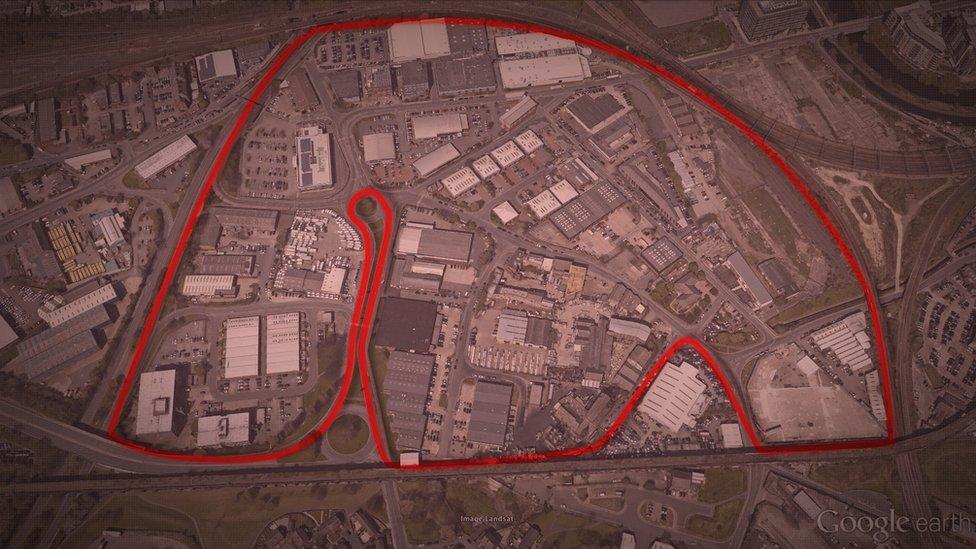
The 'managed area' in Holbeck
What are the rules of the managed area?
Working on streets outside the agreed area or times will not be tolerated
Litter including condoms/wrapping/syringes should not be left
People should respect business and other properties
Crime, public disorder and anti-social behaviour will not be tolerated
No drug use is allowed
Source: Safer Leeds Partnership

Chelsea points out a cul-de-sac where men pull up if they want business and the railway bridge that marks the end of the managed area. She says most of the people driving past are punters as they stare at her as she walks down the main road.
"I charge a lot. I tell them if they pay for steak they get steak, if they pay for mince they get mince," she says.
Around 40 women work here regularly - a mixture of migrant and British sex workers - who must be over 18.
Chelsea says street work has "changed a lot" since the area was introduced last October after a year-long pilot. Police check their welfare instead of arresting them.
"I used to get a lot of cautions. It's better like this. We are all in agreement. They're giving you a time, you have to stick to it. If you go over you've only got yourself to blame," she says.
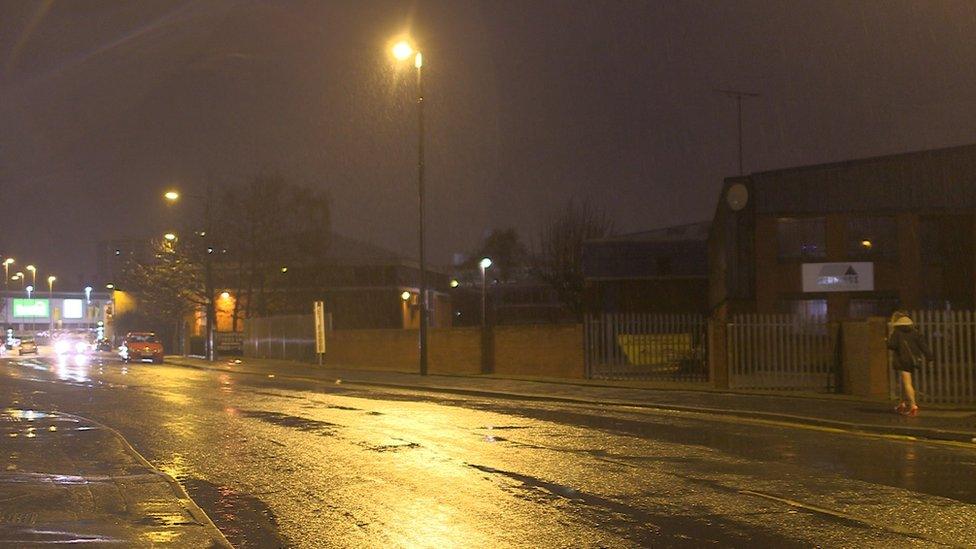
Holbeck has lots of warehouses and offices
But this approach is more than just a physical zone. The police, council and charities also support the sex workers and try to keep them safe.
Emily, a caseworker from the charity Basis, visits regularly to check if there is anything the women are concerned about and offers hot drinks and condoms.
"If we have a managed area, we know where people are. It's policed properly with marked vehicles and a liaison officer. There's extra street cleaning. It's a whole approach," she explains.
Woman killed
Chelsea was attacked two years ago on a nearby back street - badly beaten and raped while she was pregnant.
"What I suffered was bad, I was close to dying at one point. He was a vicious man. He's serving a 10-year prison sentence," she says.
But a woman has been killed since the zone was established. In December, Daria Pionko, 21, from Poland, was found injured and later died in hospital.
A 24-year-old man has been charged with her murder.
Emily admits it is not completely safe, but says it is safer, with the key being an improved relationship with the police.
The percentage of crime victims willing to report their incidents has increased from 26% to 51%, according to National Ugly Mugs - a sex worker support organisation which runs database sharing information on potentially dangerous clients.
"What happened as a result of the managed area - the trust now between girls and police - girls coming forward, punters coming forward," she said.
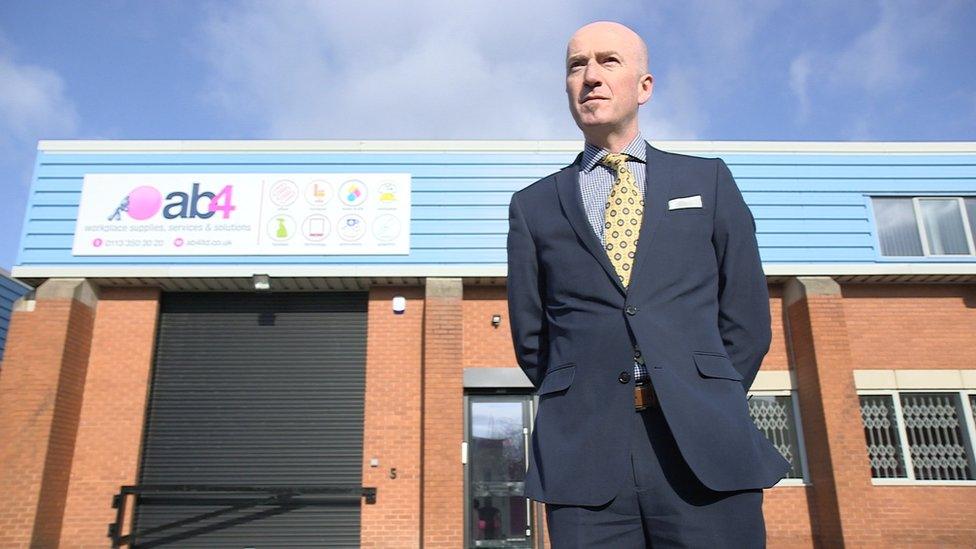
Greg Adams says the items left behind by the workers are 'shocking'
Safer Leeds - the police and council partnership - says the previous approach of police enforcement had not worked, so the zone was an attempt to reduce a long-standing nuisance. It says it has led to fewer complaints in residential areas and a significant increase in women accessing support services.
'Offensive debris'
But some people want it to close and it is under review this month.
Greg Adams, owner of an office supplies company, says while he cannot disagree with a scheme that supports the vulnerable, he feels the problem has been forced on to the businesses.
"It's just every time you drive to the end of the road you see street prostitutes plying for trade - it's very obvious - they eye you up.
"It's not that offensive, but what is offensive is the debris from nefarious activities. Used condoms, drugs paraphernalia. In the first month, two items of soiled undergarments on the street, in my yard used condoms. It's all shocking," he says.
At the end of her night's work we meet Chelsea again - she has earned £150 from three men in an hour: "Doesn't take me long to make money. Sexy girl like me. Who can resist?" she says.
The next morning it is clear it has been a busy night, they leave behind litter - beer cans, condom wrappers - you can see why people coming back to work are not happy.
It is a difficult balance - women like Chelsea would still be on these streets with or without the permission of the authorities. But the impact some feel the managed approach has had on this area's reputation may force its closure.
Watch the Victoria Derbyshire programme on weekdays between 09:00 and 11:00 on BBC Two and the BBC News Channel.
- Published1 January 2016

- Published4 March 2016

- Published6 May 2015
